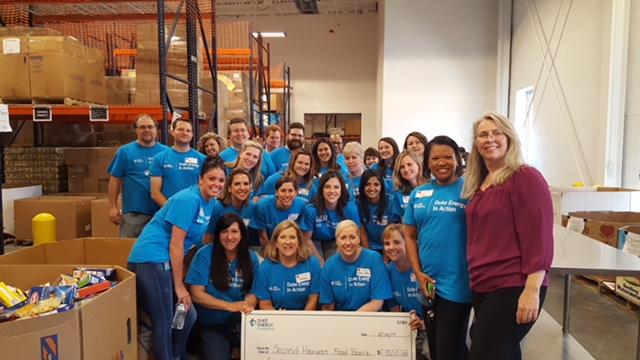4 Reasons Why Doing Good is Good for Your Company
By: Melissa Anderson, Executive Vice President, Administration, and Chief Human Resources Officer, Duke Energy
April 15-21 is National Volunteer Week, a time to recommit ourselves to community service and celebrate the change-makers who positively impact the world around them through volunteerism. Here in our headquarters city of Charlotte, Duke Energy is celebrating the week by teaming up with Share Charlotte to support Do Good Week. Through Do Good Week, we hope to educate and engage our neighbors in the many ways we can do good through volunteerism.
Employee volunteerism is fundamental to Duke Energy’s 100-year legacy as a company. We prioritize community service because it’s deeply ingrained in our culture and because it’s the right thing to do. But, as a human resources practitioner, I also see many benefits of our volunteer programs that go beyond altruism and impact our bottom line.
1. Employees prefer to work for companies that value volunteerism.
In the utility sector, 50% of the workforce is expected to retire in the next 5-10 years. We have a critical need to recruit new employees to fill those empty shoes, especially those in STEM fields. So what are millennials looking for in a potential employer? A vast majority of them want to work for a company with a strong commitment to corporate social responsibility. One of the ways we distinguish ourselves from other employers is through our volunteerism programs. We sponsor volunteer projects for our employees throughout the year and provide them with 10 paid hours to volunteer for a cause of their choice. Employees can also earn company donations through volunteerism and for those that organize a team of employees to volunteer, they can earn a $500 grant from the company for the nonprofit. For many individuals looking at employers, these perks are just as important as vacation time and free parking.
2. Employees who volunteer are engaged employees.
According to a 2015 study by the Boston College Center for Corporate Citizenship, nearly 90 percent of companies that measure the connection between their volunteer programs and employee engagement reported a positive correlation between employee participation in these programs and higher employee engagement scores. Employee engagement is a critical factor in a company’s success – companies with highly engaged employees are more profitable, have higher customer satisfaction, have higher rates of productivity and lower absenteeism and have fewer safety incidents. What’s not to like about that?
3. Employees who volunteer are healthier and happier.
When we volunteer our time, we feel good about ourselves. According to many researchers, it’s not just our ego that benefits from volunteering. A 2013 UnitedHealth Group study found that adults who volunteer have better physical and mental health, including lower levels of stress. Not only that, but service-minded people also report deeper connections with their community, which makes them happier. And, it goes without saying that healthier and happier employees are also more productive employees.
4. Employees who volunteer advance in their careers.
When we’re hiring, a track record of volunteerism can set a candidate apart because it means this person shares our values and brings unique experience to the job. And, we’re not the only employer that feels this way. A Deloitte study found that three out of four HR executives take an applicant’s skilled volunteer experience into account, making the candidate more desirable. Not only that, but you can gain invaluable experience, leadership and otherwise, through skills-based volunteerism, which enhances your own professional development.
One caveat – this list is not exhaustive. The benefits we enjoy from our commitment to community service are too many to list here. But, this much is clear: volunteerism makes individuals, companies and communities happier, healthier and stronger. So, take a moment to explore the many ways you can volunteer at your company and in your community. You owe it to yourself.



